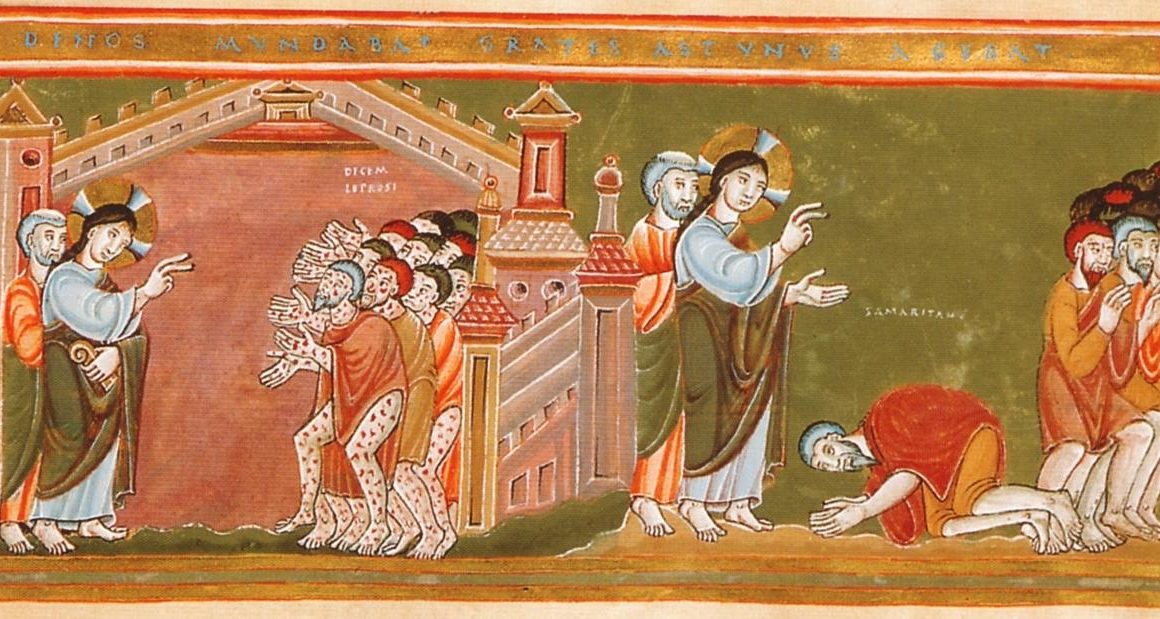Sermon for the Eighteenth Sunday after Pentecost
‘As He entered the village, He was met by ten lepers.’
+INJ+
The lepers approach our Lord, but they stop. They remain at a distance, they dare not draw nearer.
They are unclean; therefore they are not to commune with those who are pure. This they know, for they recognize only too well their own filth.
What is this leprosy? It is corruption of the flesh, a slow dying which spreads slowly across the body over years; which promises death, but a long death only. As it spreads, it makes one numb; as one becomes numb, one feels no pain or sting, and therefore his leg and arm endure the manifold minor scuffs and burns of life, ultimately leading to their destruction. Bit by bit, the body decays, numbed by leprosy, destroyed by unending self-inflicted injuries.
Is this not like sin? It is a corruption of our soul, a slow torment which spreads slowly across our souls all the days of our life. It promises hell; though only hell at the last. As sin poisons us, it makes our consciences numb; one no longer feels the sting of conscience when one sins against God, himself, his neighbor; and because of this, his soul is slowly annihilated by so many transgressions and enmities in life, ultimately leading to everlasting damnation in the fire. Day by day, the soul decays, numbed by sin, destroyed by unending self-willed sins.
It is the principle truth of the Gospel that our God has come to purify us from sin. Therefore, it is the will of Christ to purify these ten lepers the corruption of their body, of sin made flesh. For the Lord knows of no salvation that is only for the body or only for the soul. He has come to redeem His people in their totality.
The reading continues: ‘And the Lord saw them and said to them, “Go and show yourselves to the priests.”
This they do. ‘And as they went they were cleansed. Then one of them, when he saw that he was healed, turned back, praising God with a loud voice; and he fell on his face at Jesus’ feet, giving him thanks. Now he was a Samaritan.’
Indeed, he is an outcast; his own people have not a priesthood; and he is anathema to the priests of the Jews, for he is a heretic. To whom, then, shall he run? There is but one priest that he knows; there is but one mediator; one who commands the power of God and intercedes on behalf of the detested.
The Israelites go their priests. The Samaritan goes to his, Jesus, the Christ, the one incarnate God.
Jesus asks him, ‘Were not ten cleansed? Where are the nine? Was no one found to return and give praise to God?’
It is a strange question to ask, for should they really have returned? After all it was Christ himself who commanded that they go to the priests, that they might be assessed by them to see if they were indeed cured, and therefore offer the correct thank offering in accordance with the Law of Moses. Christ condemns them as lacking gratitude; yet He Himself commanded that the nine give thanks at the Temple with the priests and their sacrifices. Why then are the nine condemned?
It is not in that the nine refused to give thanks at the Temple for their miraculous healing. Rather, it is that they have not returned to give thanks at the right temple, ‘for he spoke of the temple of his body.’ It is not that the nine refused to present themselves pure and whole to the priests. Rather, it is that they have presented themselves to the priests of the Old Covenant.
For remember, our Lord speaks, ‘Was no one found to return and give praise to God?’ Indeed, now that Christ has assumed flesh, God’s presence is no longer to be sought in any building made with hands, but in His eternal body alone; there is no God on earth, save the God made man of Jesus Christ.
The Samaritan has done well, for the Samaritan has returned to his priest, and his God. He who recognized only too well the filth of His flesh stands in the presence of the God who purifies the flesh.
And he praises God, for ‘great are the works of the Lord, full of splendor and majesty is his work.’
We, who suffer from the leprosy of the soul, have now returned this day in imitation of him who suffered from the leprosy of the flesh. Have you not left this place before? Do you now not return again? And to whom do you return but that Samaritan’s very own God and priest?
You have indeed come to the same Lord; and even as by the majesty of His Spirit, Christ healed the body of the leper; so now by the glory of His flesh shall He purify your soul.
Stop not, and remain not at a distance, but draw nearer, and take the body of the Lord, Almighty God, that you may be cleansed. Come and take of this most holy Eucharist, that you may give thanks.
For having been justified by the flesh, and sanctified in His blood, you shall stand, you shall bow before the altar, and you shall hear in your mind the simple release of God, His freedom:
‘Rise and go your way, your faith has made you well.’
+INJ+
Preached by Pastor Fields
Sermon Texts: Ruth 1:1-19, Psalm 111; 2 Timothy 2:1-13; Luke 17:11-19



